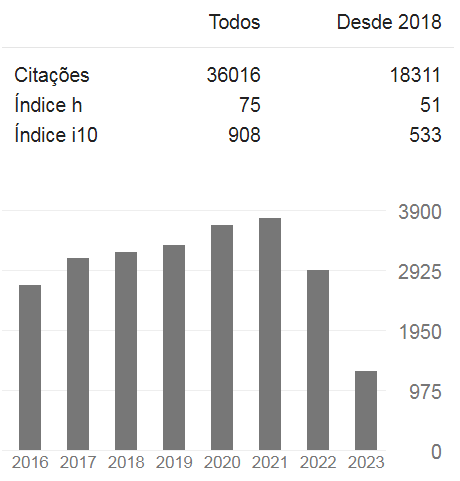Ways of being of nursing professionals in the pediatric intensive therapy
experiences with families
DOI:
https://doi.org/10.5935/1415-2762.20200042Keywords:
Intensive Care Units, Pediatric, Professional-Family Relations, Nursing, Team, Pediatric NursingAbstract
Objective: to understand the experiences of Nursing professionals with the families of children hospitalized in a pediatric intensive care unit. Method: this is a qualitative study, using the analysis of the structure of the situated phenomenon as a methodological reference, carried out with 19 Nursing professionals working in the pediatric intensive care unit, of a public hospital in the state of São Paulo. We analyzed the speeches from the interviews according to the guidance of Martins and Bicudo. Results: two thematic categories emerged: "The family-being important for children in the pediatric intensive care unit"; "Being-yourself in the technique mode in family care in the pediatric intensive care unit". Discussion: the inclusion of the family does not happen in the studied unit because despite perceiving the benefits that the families bring to the child, they let it appear that they do not truly understand the importance of the presence of the family in the pediatric intensive care unit, revealing a long way to go. This is because professionals will need to be equipped to share this care, which is currently the sole responsibility of the Nursing team. Conclusion: this study revealed that professionals pay attention more to the technique for the person and the unpreparedness in dealing with the demands of the family. We expected that the voice of these Nursing professionals will enable reflection on possible interventions whose purpose is to welcome and insert the family in the care of hospitalized children.
References
Hill C, Knalf KA, Santacroce SJ. Family-centered care from the perspective of parents of children cared for in a Pediatric Intensive Care Unit: an integrative review. J Pediatr Nurs. 2017[citado em 2017 abr. 10];S0882-5963(17):30531-6. Disponível em: https://doi.org/10.1016/j.pedn.2017.11.007
Ministry of Health (UK). Report on the welfare of children in hospital. London: HMSO; 1959.
Congresso Nacional (BR). Lei nº 8069, de 13 de julho de 1990. Dispõe sobre o Estatuto da Criança e do Adolescente e dá outras providências. Diário Oficial da República Federativa do Brasil, 16 de jul 1990.
Soares LG, Rosa NM, Higarashi IH, Marcon SS, Molina CM. Pediatric ICU: the meaning of taking care in the mother’s perspective. Rev Pesqui Cuid Fundam. 2016[citado em 2017 abr. 10];8(4):4965-97. Disponível em: https://www.doi.org/10.9789/2175-5361.2016.v8i4.4965-4971
Mattsson J, Forsner M, Castrén M, Arman M. Caring for children in pediatric intensive care units: an observation study focusing on nurses’ concerns. Nurs Ethics. 2013[citado em 2017 abr. 10];20(5):528-38. Disponível em: 10.1177/0969733012466000
Baird J, Davies B, Hinds PS, Baggott C, Rehm RS. What impact do hospital and unit-based rules have upon patient and family-centered care in the Pediatric Intensive Care Unit? J Pediatr Nurs. 2015[citado em 2017 abr. 10];30(1):133-42. Disponível em: 10.1016/j.pedn.2014.10.001
Vasli P, Nayeri ND, Nezhad LB. Dominance of paternalism in family centered care in the pediatric intensive care unit (PICU): an ethnografhic study. Issues Compr Pediatr Nurs. 2015[citado em 2017 abr. 10];38(2):118-35. Disponível em: https://www.tandfonline.com/doi/abs/10.3109/01460862.2015.1035464?journalCode=icpn20
Martins J, Bicudo MAV. A pesquisa qualitativa em psicologia: fundamentos e recursos básicos. São Paulo: Moraes; 2005.
van Rijnsoever FJ I can’t get no saturation: a simulation and guidelines for sample sizes in qualitative research. PLoS One. 2017 Jul 26[citado em 2017 abr. 10];12(7):e0181689. Disponível em: https://journals.plos.org/plosone/article?id=10.1371/journal.pone.0181689
Pontes EP, Couto DL, Lara HMS, Santana JCS. Comunicação não verbal na unidade de terapia intensiva pediátrica: percepção da equipe multidisciplinar. REME - Rev Min Enferm. 2014[citado em 2017 abr. 10];18(1):152-7. Disponível em: 10.5935/1415-2762.20140012
Melo EMOP, Ferreira PL, Lima RAG, Mello DF. Envolvimento dos pais nos cuidados de saúde de crianças hospitalizadas. Rev Latino-Am Enferm. 2014[citado em 2017 abr. 10];22(3):432-9. Disponível em: 10.1590/0104- 1169.3308.2434
Mekitarian FFP, Angelo M. Family’s presence in the pediatric emergency room: opinion of health’s professional. Rev Paul Pediatr. 2015[citado em 2017 abr. 10];33(4):460-6. Disponível em: https://doi.org/10.1016/j.rpped.2015.03.010
Yager PH, Clark M, Cummings BM, Noviski N. Parent participation in pediatric intensive care unit rounds via telemedicine: feasibility and impact. J Pediatr. 2017[citado em 2017 abr. 10];185:181-6. Disponível em: 10.1016/j.jpeds.2017.02.054
Sanders Jr RC, Nett ST, Davis KF, Parker MM, Bysani GK, Darko MA, et al. Family presence during pediatric tracheal intubations. JAMA Pediatr. 2016[citado em 2017 abr. 10];170(3):e154627. Disponível em: 10.1001/jamapediatrics.2015.4627
Cardoso JMRM, Rodrigues BMRD, Pacheco STA, Araujo BBM. Relative’s intentional action towards children in the Pediatric Intensive Care Unit. Rev Enferm UERJ. 2013[citado em 2017 abr. 10];21(1):600-5. Disponível em: http://www.e-publicacoes.uerj.br/index.php/Enfermagemuerj/article/view/10033/8066
Curtis K, Foster K, Mitchell R, Van C. Models of care delivery for families of critically ill children: an integrative review of international literature. J Pediatr Nurs. 2016[citado em 2017 abr. 10];31:330-41. Disponível em: 10.1016/j.pedn.2015.11.009
Geoghegan S, Oulton K, Bull C, Brierley J, Peters M, Wray J. The experience of long-stay parents in the ICU: a qualitative study of parent and staff perspectives. Pediatr Crit Care Med. 2016[citado em 2017 abr. 10];17:e496-501. Disponível em: 10.1097/PCC.0000000000000949
Carnevale FA, Farrell C, Cremer R, Séguret S, Canouï P1, Leclerc F, et al. Communication in pediatric critical care: a proposal for an evidenceinformed framework. J Child Health Care. 2016[citado em 2017 abr. 10];20(1):27-36. Disponível em: 10.1177/1367493514540817
Alves MVMFF, Cordeiro JG, Luppi CHP, Nitsche MJT, Olbrich SRLR. Experience of family members as a result of children’s hospitalization at the Intensive Care Unit. Invest Educ Enferm. 2013[citado em 2017 abr. 10];31(2):191-200. Disponível em: http://www.scielo.org.co/pdf/iee/v31n2/v31n2a04.pdf
Angelo M, Cruz AC, Mekitarian FFP, Santos CCS, Martinho MJCM, Martins MMFPS. Atitudes de enfermeiros em face da importância das famílias nos cuidados de Enfermagem em pediatria. Rev Esc Enferm USP. 2014[citado em 2017 abr. 10];48(n.esp):75-81. Disponível em: 10.1590/S0080-623420140000600011
Silva JL, Santos EGO, Rocha CCT, Valença CN, Bay Jr OG. Organização do trabalho de Enfermagem diante da inserção dos cuidados familiares com a criança hospitalizada. Rev Rene. 2015[citado em 2017 abr. 10];16(2):226-32. Disponível em: 10.15253/2175-6783.2015000200012
Levenaar JK, Rizzo PA, O’Brien ER, Lindenauer PK. Paediatric hospital admission processes and outcomes: a qualitative study of parent’s experiences and priorities. BMJ Qual Saf. 2018[citado em 2017 abr. 10];27(10):790-8. Disponível em: 10.1136/bmjqs-2017-007442
Capello T, Neri MC, organizadores. Programa Bolsa Família: uma década de inclusão e cidadania. Brasília: Ipea; 2013.
Franck LS, Ferguson D, Fryda S, Rubin N. The child and family hospital experience: is it influenced by family accommodation? Med Care Res Rev. 2015[citado em 2017 abr. 10];72(4):419-37. Disponível em: 10.1177/1077558715579667
McAlvin SS, Carew-Lyons A. Family presence during resuscitation and invasive procedures in pediatric critical care: a systematic review. Am J Crit Care. 2014[citado em 2017 abr. 10];23(6):477-84. Disponível em: 10.4037/ajcc2014922
Downloads
Published
Issue
Section
License
Copyright (c) 2020 Reme: Revista Mineira de Enfermagem

This work is licensed under a Creative Commons Attribution 4.0 International License.






































